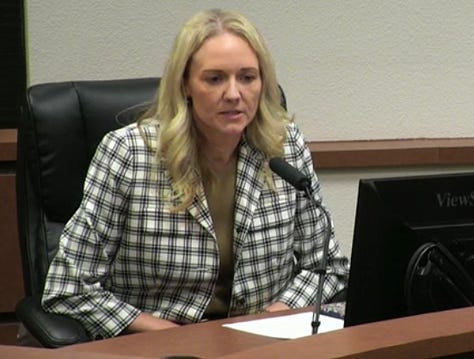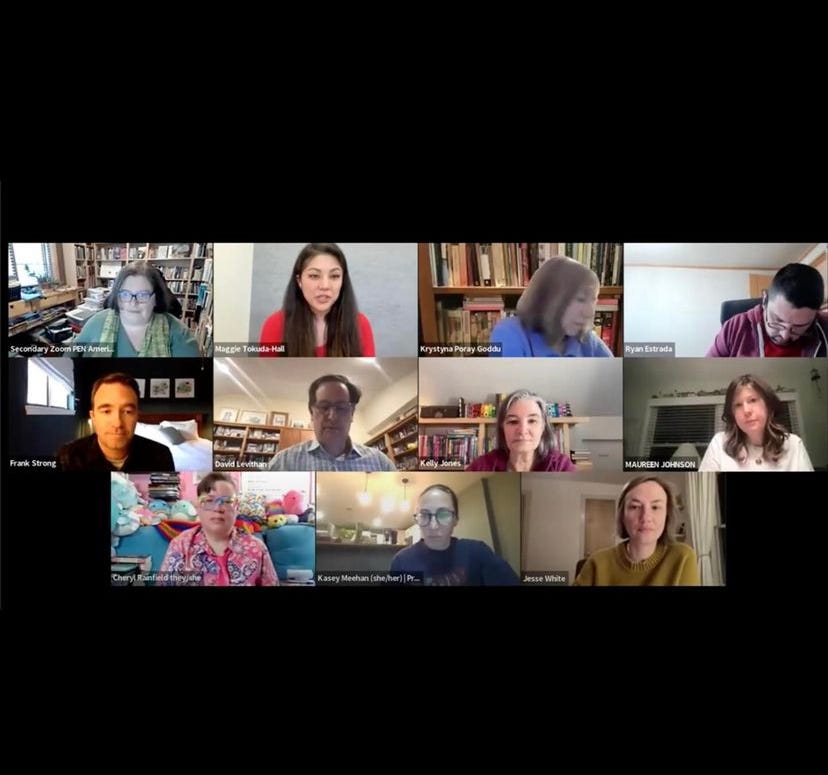What Makes a Green-Flag School Board Candidate?
And: The Book-Loving Texan's Guide to the May 2024 School Board Elections is now live!



It’s up! The principal labor of my life (apart from, you know, teaching and organizing with the Texas Freedom to Read Project and writing this Substack) is the Book-Loving Texan’s Guide to School Board Elections.
Its newest edition, previewing May’s elections across Texas, is now live. This is the fifth election cycle I’ve made this guide, and typically I announce it by showcasing some of the scariest and most extreme candidates up for election. This year, though, I decided to go in the opposite direction, and highlight two of the candidates who have most impressed me—Lake Travis ISD incumbents Phillip Davis and Lauren White.
I’m doing this because what we’re really, truly lacking in Texas are true green-highlight candidates—folks who are able to show both thoughtfulness and backbone when its time to make decisions about books.
I’m not even (just) talking about standing up for the freedom to read, though that’s important. Trustees should know their district policies and state laws; they should consider the needs and perspectives of everyone with a stake in the district’s success (parents, students, educators, taxpayers); they should be willing to consider instructional materials and library books in their entirety (when possible) and try to understand why those materials might be selected or what purpose they might serve in helping the district reach its goals.
Finally, they ought to be able to defend district employees when, for doing their jobs, they’re called groomers or perverts or indoctrinators.
If they can’t do these things, they’re going to be steamrolled by bullies like Citizens Defending Freedom or this out-of-state grifter who’s currently being flown from district to district in Texas to yell a bunch at board meetings.
What does that kind of courage and thoughtfulness look like in practice?
Here are two examples. In a November meeting in Lake Travis ISD, the board was tasked with hearing a Level-3 grievance regarding three library books. The books were removed, with the only votes to keep the books coming from Lauren White and Phillip Davis, who are both running for re-election this May. White’s comments, in particular, were impressive. In just two minutes, White managed a full defense of parental rights, the freedom to read, AND her district’s employees.
“The librarians in our schools are professionals and have a lot of experience in education,” she started. Then she added, “It strikes me as important that these are library books for self selection, and they may not be for everyone and perhaps, maybe definitely not for every family.” She continued, addressing the complainant: “Something you said, earlier Ms. Dover, stuck with me, that getting a book removed is not as simple as sending an email. And it’s not, but getting a book removed so that your own child cannot read is as simple as sending an email, and I think as a district we can do more to communicate that to parents.”
Finally, she said, “I trust parents to be able to make decisions for their children.”
You really should see the video:
In March, White did it again—this time in response to challenges to two novels by Jesse Andrews, The Haters and Me and Earl and the Dying Girl.
Focusing on the latter book, White did what I’ve been begging the people with the power to make decisions about books to do: consider the value of the texts in question, and what benefits they bring their readers, and not just the few out-of-context passages they’ve been presented from BookLooks.org. “If you have ever lost someone from cancer, and you loved them,” she said, “there may be parts of this book that you can relate to in those feelings. And I’m not saying that everyone in that situation would relate, but that kind of connection that can be personal, to me is literary value.”
Davis echoed that point. “There are scenes in the book that I don’t like. It’s not my preference,” said Davis. “But when I look at it, there is value in the book in terms of helping establish and understanding of what someone may go through or what they may experience when facing someone who is going through a tragic illness.” Davis also pointed out that “listening to the community” means considering all members of the community–not just the people demanding books be removed.
What’s more, Davis had a rejoinder to the argument that the book should be banned because of the number of times the F-word appears in it (an argument that comes up a lot): “The amount of time that it took you to read the book to get to 97 F-bombs? I will give you less than an hour to go to any one of our practice sessions, or any one of the fields, and you will hear that. … It is present in our community, and [the book] is representative what is happening in our community.” In other words, Davis made the obvious point that it’s absurd to suggest that teen readers can’t handle realistic depictions of common teen experiences.
Davis and White were alone in voting to retain The Haters, but they were joined by conservative, PAC-backed trustees Erin Archer and Kim Flasch in voting to save Me and Earl and the Dying Girl—the only book that the LTISD board has saved this school year.1
Watching Davis and White intervene with fortitude and conviction as well as generosity to those who disagree with them, it was an easy decision to give both green highlights in my guide. We need more people like them on Texas school boards.
Once again, here’s the link to the guide. Currently, there are nine districts posted, but that number will grow in the coming weeks. Remember to check back frequently, as I’ll be updating it all the way to election day.
ALSO: I had the opportunity this week to walk some members of Authors Against Book Bans—an AMAZING new organization that is partnering with the Texas Freedom to Read Project—through the research steps I take in creating my voting guide. If you (or a group you know) are interested in learning how I do what I do, please contact me!
Archer’s comments on Me and Earl and the Dying Girl were also impressive—a testament to the value of careful consideration of the full text of a book. When I posted them on Twitter this week, members of the Texas book-banning brigade lost their minds, insisting that Archer couldn’t possibly be a true conservative. Reader, she most definitely is.




